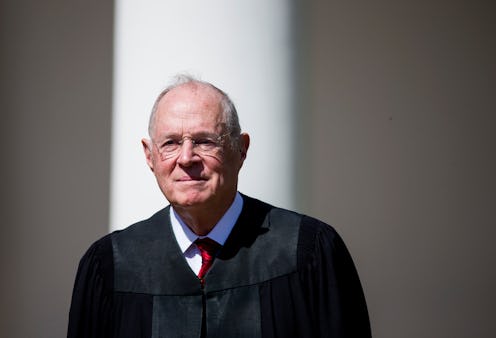News
This Is Why D.C. Thinks SCOTUS Justice Anthony Kennedy Will Retire This Summer

The Supreme Court could be in for a shakeup this summer. According to audio obtained by Politico, at least one Republican senator, Dean Heller, believes that Justice Anthony Kennedy is planning to retire — a move that would open up a new seat on the bench, which is currently held by a 5-4 Republican majority. Kennedy is a conservative justice who was appointed by Reagan and has served for 30 years.
Heller made the admission during a keynote speech for a J. Reuben Clark Law Society event in Las Vegas last week. In reference to November's midterm elections — Heller is up for reelection and needs an energetic GOP base to show up to vote for him — he brought up the prospect of Kennedy's departure.
"Kennedy is going to retire around sometime early summer," Heller said. "Which I’m hoping will get our base a little motivated because right now they’re not very motivated. But I think a new Supreme Court justice will get them motivated."
Heller is generally thought to be Democrats' most likely opportunity to flip a Senate seat blue. Nevada, which is a swing state, is rapidly getting more diverse and has been turning more Democratic in recent years. The state voted for Hillary Clinton over Donald Trump by 2.4 points in 2016.
Heller acknowledged the threat in his speech. "This is the most difficult race in America," he said. "This is the No. 1 race in America."
Kennedy's departure, whenever it happens, will open up a spot on the court. If he leaves during a Republican administration while Republicans control Congress — as will be the case if he exits this summer — he will almost certainly be replaced by another conservative.
Trump's election instilled fear in liberals for this very reason. Kennedy has been one of court's most likely prospects for retirement for some time now. He's 81 years old and has served longer on the court than any other justice.
However, if Kennedy does retire under Trump but leaves a bit later, Democrats might get the chance to block Trump's replacement nominee. If Congress flips blue in November, liberals could refuse to confirm any of the president's Supreme Court picks. It would be in the spirit of the GOP's decision to block President Obama's nomination of Merrick Garland, a Democrat, in 2016.
Although he's a registered Republican, Kennedy has been perhaps the most centrist voice among the court's conservatives and has often been considered a "swing" vote. In 2013, for example, he voted in favor of reversing parts of the Defense of Marriage Act that didn't allow gay couples to receive marriage benefits from the federal government.
It seems unlikely that Trump would pick another moderate Republican to replace Kennedy. Early last year, after all, he nominated Neil Gorsuch, who is generally considered to be a hard-right justice. Before joining the Supreme Court, Gorsuch voted to permit the Oklahoma Department of Corrections to prohibit an imprisoned transgender woman from wearing feminine clothing and receiving hormonal treatment. While serving on the court last June, he voted to allow Arkansas officials to forbid birth certificates from listing the names of both of a child's parents if they're gay.
The Washington Post's Ruth Marcus has argued that Trump becomes more likely to nominate extreme Supreme Court candidates as his presidential term gets increasingly unstable. "With President Trump under investigation by the special counsel and his approval rating mired below 40 percent," she wrote last June, "his incentive may be to cater to his base with a pick as far to the right as possible."
Recently there's been on-and-off speculation that Kennedy plans to retire in the near future. At the beginning of this year, he hired four clerks for a one-year term that will begin this October. The move was interpreted by some as a signal that he plans to stick around until at least the fall of 2019.
But if Senator Heller is correct — which is far from confirmed — Kennedy actually plans to depart quite a bit earlier than that. If he does exit this summer, it could enable Trump to insert another hard-right justice who might cause the court to lean toward extreme conservatism for many years to come.